|
|
STANDARD RULES
|
|
WHAT YOU NEED
OVERVIEW
Volcano is a clever, puzzle-style game in which players move
"caps" around on top of a group of volcanoes, triggering
eruptions which cause colored streams of lava to flow out across
the playing field. The object of the game is to capture
as many pieces as possible, with bonus points awarded for special
combinations. Each player attempts to accumulate the highest
score and then bring the game to a close before another player
has a chance to steal the lead away. Multi-player Volcano
supports any number of players, though between 2 and 6 is best.
It can be also played by a single player as a solitaire challenge.
| SETUP Using all of the pieces except the black ones, create 25 solid-color nests, and arrange them into a 5x5 square. (A "nest" consists of a large piece on top of a medium piece on top of a small piece.) Set aside the medium and large black pieces - they will not be used during the game. Place the five small black pieces on top of five nests, using one of the configurations shown here. (After a few games, you may want to try creating your own opening patterns.) |
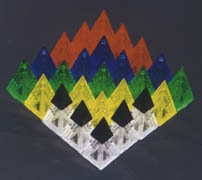 |
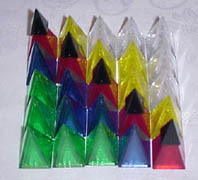 |
THE PLAY
Each stack of pieces within the 5x5 grid represents a volcano,
and the five small black pieces represent "caps" which
keep the volcanoes beneath them from erupting.
On your turn, you may move any one of the five caps in any direction (horizontally, vertically, or diagonally) for a distance of one space. You may not place a cap on top of another cap, and you may not move a cap outside of the 5x5 square. Any other move is legal.
Moving a cap may cause the underlying volcano (if there
is one) to erupt. If a move does not cause a volcano
to erupt, you are allowed to make another move with one of the
caps. You may continue to move caps in this fashion until
an eruption does occur, at which point your turn ends and play
passes to the player on your left.
|
ERUPTIONS
After you've finished executing the eruption, you may capture any erupting piece which has landed directly on top of a piece of the same size. Keep all of your captured pieces in front of you, to be tallied at the end of the game for your final score.
NON-ERUPTIONS During your turn, you may continue to move black caps until
you cause a volcano to erupt. With practice, you can learn
how to position the caps just so, in order to capture
the exact piece you're hoping for. SCORING
You're free to rearrange your captured pieces at any time during or after the game, in order to create the best possible score. ENDING THE GAME |
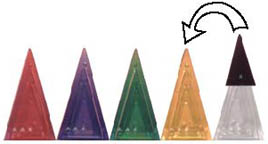
|
|
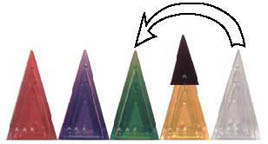
|
|
|
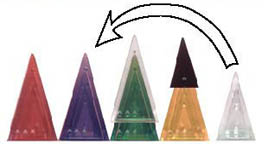
|
|
|
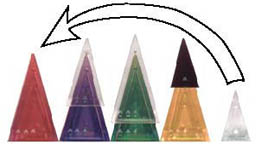
|
|
|
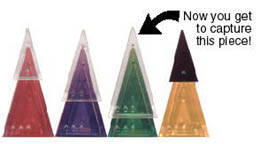
|
SOLITAIRE CHALLENGES
Volcano also makes for great fun as a solitaire activity.
(In fact, Kristin initially envisioned it as a solitaire game.)
Solitaire Volcano is more like a puzzle than a typical solitaire
game; the trick to these solitaire challenges lies in developing
your ability to move the black caps around, so that you'll be
able to take the specific piece(s) you desire. It may take a few
games, but once you get a perfect score you'll probably want to
tackle a new challenge (or find other players) rather than solve
the same puzzle again. These challenges make excellent training
for multi-player Volcano.
CREDITS
Mini-Volcano
A Volcano Variant for 4 Icehouse Colors
Intro
Volcano has become many people's favorite Icehouse game, but the fact that it requires 6 stashes has kept some players from being able to try it.
A couple of weeks ago on the Icehouse list, Derek Hohls asked if there was any way to play Volcano with just the basic 4 colors of a standard Icehouse set, and Ryan McGuire said: "Hey, I know, how about Mini Volcano? Play with the four basic colors on a 4x4 board."
Good idea, Ryan! We've been playtesting variations on this theme for the last couple of weeks, and while full-size Volcano is definitely better, Mini-Volcano is really pretty good. In fact, it makes for a shorter game, which may even be preferable.
Setup
Here's what you do. Make 15 nests using the Green, Blue, and Yellow pyramids, and set aside the medium and large Reds. Small Reds will do the job of the Black caps used in the full game. (This can be a little confusing for seasoned Volcano players, but one quickly gets used to it.)
Then you must decide what type of setup to use. As in full
Volcano, many arrangements of the colors within the board are
possible, but you can also choose to play on an almost-full 4x4
grid or on a largely empty 5x5 board, as shown. Both setups yield
enjoyable games... try 'em both to see which you fancy.
|
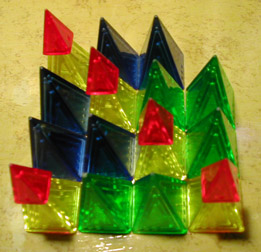 |
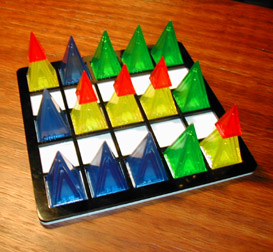 |
Ending
The movement, capture, and scoring mechanisms in Mini-Volcano are all the same as in the full game. Only the end condition is different. With only 3 colors to capture, it would end far too abruptly if you stopped when someone has one of each color, so we've been playing until a player is unable to make a move that results in the capture of a piece.
The only problem with this ending condition is that you might sometimes conclude that the game is over when it really isn't, just because no one is able to discover a piece-taking move. If you think no such moves exist, say so... but don't be surprised if the other player says "No, wait... you could take a piece this way." Needless to say, it would be highly Uncool to pretend you don't see a move just because you want the game to end...
Note that it's always legal to make a move without making a
capture; the game ends only when no piece can be captured, not
when a move is made without capturing something.
Mega-Volcano
A Volcano Variant for 9 Icehouse Colors
If you dig Volcano and you happen to have a full set of 9 Icehouse stashes, here's an advanced version of the game you can try. It's played just like regular Volcano, but with the following differences. First, it uses a 6x6 board-space, instead of the 5x5. Put the 7 translucent colors together in nests, and arrange them however you wish within the 6x6 space, leaving one hole open in one of the centermost squares. Fill in this last space with a single nest from the white stash, then place the 5 small blacks onto the red pieces just as you would in the standard game. (Set aside the rest of the black and white pieces... they will not be used.)
The game then plays as before, except that now you need all 7 colors to trigger the end. The white pieces are not counted towards this total, because they are treated as wildcards. During score-counting, a white piece can be considered any other color you wish, thus making them very useful for completing monochrome trees. More importantly, any player who captures all 3 of the white pieces automatically wins the game.
Random Layouts
While the Standard Rules call for arranging the pyramids in one of various patterns, many players enjoy a totally random setup.
Who Goes First?
Andy likes to say that the player who's been closest to actual molten lava goes first.
Fancy Plastic Boards
We now stock really cool plastic Volcano boards are now being made for us by the friendly folks at Kadon.
Nifty Paper Boards
A lovely paper Volcano board was included in the centerfold of Hypothermia in Issue #15.
Freely Downloadable Boards
Several fans have created Volcano gameboard art you can download and print yourself:
also see Blockade - another Icehouse game designed by Kristin